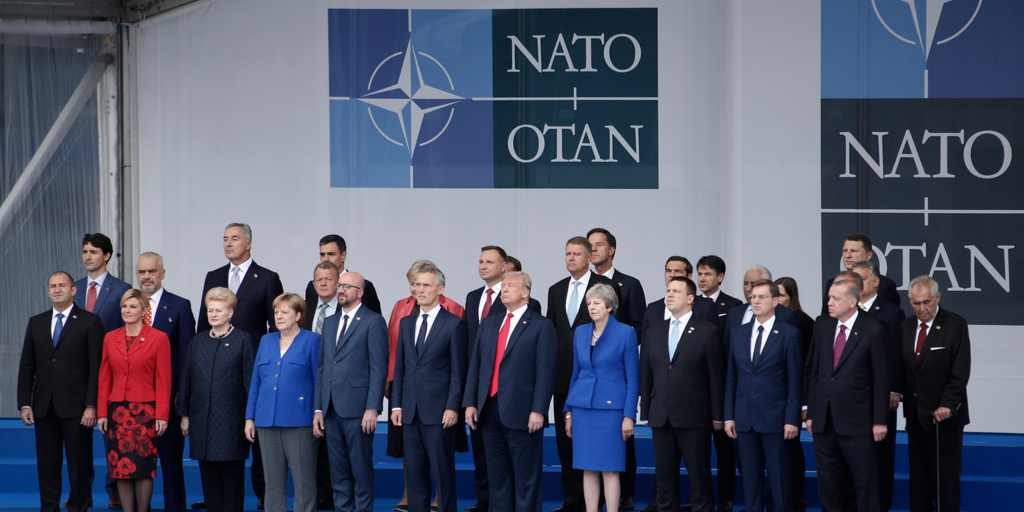Do Korean "K-dramas" signal the weakening of America's global cultural dominance?
To Hell and Back
Stephen Walt’s name has become synonymous with a certain approach to international relations scholarship. Together with John Mearsheimer, Barry Posen, Kenneth Waltz, Christopher Layne, and others, Walt has defined the school of neorealism or structural realism. Taking the structure of the international system and the distribution of power among states as their key explanatory variables, neorealists purport to explain a broad range of international phenomena.
Walt and other prominent neorealists have also tried their hand at policy advocacy, usually ending up with some variant of “restraint,” or, in Walt’s formulation, “off-shore balancing.” But policymakers have not made a habit of listening to neorealists’ policy advice. Why not? To answer that question, Walt has written a new book, The Hell of Good Intentions: America’s Foreign Policy Elite and the Decline of U.S Primacy.
Liberal Hegemony: Bad Strategy or Strawman?
Walt is unsparing in his critique. “The United States spent the past quarter century pursuing an ambitious, unrealistic, and mostly unsuccessful foreign policy,” he argues. Advocates of liberal hegemony are guilty of “viewing the United States as the ‘indispensable nation’ responsible for policing the globe, spreading democracy, and upholding a rules-based, liberal world order.” His attempt at a breezy writing style in this book leaves him relying on some catchy rhetorical overstatements: “Washington sought to remake other countries in its own image.”
Walt, like Mearsheimer, accuses the United States of pursuing something called “liberal hegemony” since the end of the Cold War. As I wrote in my earlier review of Mearsheimer’s book, the United States has done no such thing. Walt claims the United States should have “retrench[ed] slightly” after the Cold War but “the foreign policy establishment never considered this possibility for more than a moment.”
This is false. In fact, the United States retrenched considerably during the 1990s: it cut its military and intelligence budgets by about a third, reduced the size of its standing military forces by about the same amount, severely cut foreign aid, public diplomacy, and the diplomatic corps, demobilized and destroyed its own chemical weapons stockpile, decommissioned three-quarters of its nuclear warheads, and withdrew most of its troops from overseas. “Liberal hegemony” is a straw man concocted by Walt with which to pillory U.S. policymakers. It is a rhetorical exaggeration designed to make his opponents look extreme and himself moderate by comparison.
In some cases, Walt’s picture of “liberal hegemony” rests on simple factual errors. He claims the U.S. “sometimes devoted a higher percentage of its much larger GDP to defense than . . . potential adversaries as Russia and China.” It is unclear what Walt means by “sometimes”—it appears to be true during the height of the Iraq and Afghanistan surges—but since the end of the Cold War the U.S. has averaged defense spending of around 3 percent of GDP. Russia has never dropped below 3 percent in the last 25 years. But Walt’s narrative cannot be subverted by a few inconvenient facts.
Walt complains that U.S. leaders did not pursue hegemony “in order to protect the American homeland from invasion or attack. Rather, they sought it in order to promote a liberal order abroad,” later criticizing military deployments to “faraway places” such as Afghanistan, Bosnia, Iraq, Kosovo, and others. Walt is being disingenuous. Afghanistan was, of course, in direct response to an attack on America. Bosnia and Kosovo were related to European allies’ security. Iraq was (mistakenly) thought to be a threat to U.S. security because of weapons of mass destruction.
He supports his claim about America’s expansionism by highlighting that the United States’ treaty commitments have grown. It is true that NATO has increased its membership, but the larger number of states in NATO did not increase the United States’ defense commitments; it simply moved the boundary line of the United States’ singular commitment to European security. Worse, Walt lists the Rio Treaty as another example of America’s overstretched defense commitments. The Rio Treaty, ostensibly a mutual defense treaty incorporating almost the entire Western Hemisphere, is dead, having never made a single claim on U.S. resources or attention in 70 years. Several states have formally left the treaty in recent years, and no one treats it as a serious entity, much less a drain on U.S. defense.
But more importantly, the dichotomy between American security and liberal order that Walt tries to draw is a false one. The heart of the case for a more engaged, internationalist grand strategy is that liberal order is the outer perimeter of American security. Walt’s own view, outlined in his last chapter, is that investing in liberal order is a waste of time and money and bound to cause a backlash. About the only things he believes the U.S. needs to worry about are China and the Persian Gulf. Even Europe, which he recognizes is vital, faces no real threat from Russia and Walt calls for gradually decreasing the U.S. role in European security. Walt’s prescriptions would, of course, weaken the very international environment that had enabled the U.S. to take a relaxed view of its security in the first place.
Unconsidered Alternatives
With that in mind, it is easier to see how Walt’s first chapter is a perfect example of the post hoc ergo propter hoc fallacy. He sketches a picture of the United States’ position in the world in 1991, another in 2016, and asserts all the deterioration is attributable to the U.S.’s foolish pursuit of “liberal hegemony.” He does not consider the alternatives: that things might have been even worse if the U.S. acted otherwise or that many other factors—particularly economic and demographic ones—played a role in shaping the international environment during the quarter-century in question.
Indeed, it is not even clear if Walt actually believes in his own boogeyman. He acknowledges the many ways in which the United States did not pursue liberal hegemony—but then ties himself in knots characterizing those policies as exceptions or aberrations to the broad pattern of liberal hegemony. Walt wants his master narrative to work: everything bad about U.S. foreign policy is because of liberal hegemony, and everything that is good is because the U.S. didn’t pursue liberal hegemony but actually exercised wise restraint instead. (In this sense, Walt’s argument is similar to how Patrick Deneen’s defines “liberalism” as the source of all bad things in American politics in Why Liberalism Failed. One can win an argument by redefining words all day long, but it will not shed much light on the real world.) He treats the Cold War similarly: by and large, it was an example of wise offshore balancing—except Vietnam, which was liberal hegemony. Occam’s Razor is useful here: a simpler way of reading the data is that the United States never actually pursued the elusive strategy of liberal hegemony in the first place.
Undaunted, Walt blames the strategy of liberal hegemony for the “costly quagmires in Afghanistan, Iraq, and several other countries,” as if the United States invaded those countries with the express and sole purpose of forcibly democratizing them. Of course, that isn’t the case: the United States got into those wars out of concern for terrorism and weapons of mass destruction. Regardless of one’s views of those wars, it hardly seems fair to blame them on a purported strategy of liberal hegemony.
Part of the problem is Walt’s double standard in which he always manages to find a way to blame the United States for international crises. The war in Ukraine? America’s fault for expanding NATO. ISIS? America’s fault because of the Iraq war. The election of Mahmoud Ahmedinejad and Iran’s hostility to the United States? America’s fault for being mean to Iran. Walt overemphasizes the United States’ agency to the exclusion of other world actors such that even their direct actions and choices, like the Russian invasion of Ukraine, are always explained as rational responses or reactions to American mistakes. He rarely considers the alternative: it is possible that U.S. foreign policy choices are rational responses to other actors’ threats.
Nor is it clear if Walt’s contrasting pictures of the world in 1991 versus 2016 yields the conclusion he means it to. “When the Cold War ended, U.S. leaders expected that a rising liberal tide would accelerate the spread of democracy, human rights, and open markets and would usher in an unprecedented era of peace and global prosperity,” he writes. Yes, they did expect that—and rightly so, because it mostly came true. The post-Cold War era is, of course, the high point of democracy and human rights in all of recorded human history and, the 2008 financial crisis excepted, has also been an unprecedented era of prosperity at home and abroad. I don’t mean to be Pollyannaish—I start my own book lamenting the many failings of U.S. foreign policy—but Walt’s depiction of unrelenting incompetence and decline does not pass the smell test.
Corrupt Elites?
Among Walt’s more pointed criticisms is his treatment of the foreign policy elite. Chapter 3 is the best part of the book, in which Walt does the work of an anthropologist or ethnographer, describing the ecosystem and the epistemic community of scholars, policymakers, think tankers, journalists, and others who make up America’s foreign policy establishment. His description is apt, and the chapter—likely to Walt’s chagrin—could serve as a useful career map for aspiring foreign policy professionals.
He damns the foreign policy community for a culture of lax accountability, which is true, and he is dead on about the “activist” bias of the U.S. foreign policy establishment, the inveterate need to “do something” in response to the headline of the day. But he goes further. “Today’s foreign policy elite is a dysfunctional caste of privileged insiders who are frequently disdainful of alternative perspectives and insulated both professionally and personally from the consequences of the policies they promote.” This, I think goes too far.
In the most inflammatory and baseless accusation of the book, he argues that foreign policy elites support the strategy of liberal hegemony because it is a “full employment policy” for themselves. The establishment “understood that [liberal hegemony] was very good for them. Open-ended efforts to remake the world in America’s image gave the foreign policy establishment plenty to do, appealed to its members self-regard, and maximized their status and political power.”
To be clear, Walt offers exactly zero evidence for this claim. Indeed, he does not even try, beyond simply highlighting the alignment of interest. He pays perfunctory lip service to foreign policy professionals’ patriotism and sincerity, but doubles down on the claim that liberal hegemony is attractive to the foreign policy elite because of the prestige, power, and employment opportunities it provides. (His argument is out of date: the job market has already adapted in line with his preferences more than he recognizes.) Certainly, this might be an unconscious motive for some in the “Blob,” but if it were systematically true of a preponderant portion of foreign policy professionals in America, we would expect to see evidence in private memoirs, letters, or emails; or in public sources, such as job postings, job training programs, university advertisements, think tank reports, and more. Walt provides none, in the absence of which his accusation is little more than a school-yard smear.
Walt’s poor manners do not end there. In 2002, Walt and a few dozen international relations scholars signed a statement warning against going to war in Iraq. In this book, he complains that none of the signatories have ever gotten a job offer as a reward for their prescience. (If accurate predictions were job qualifications, I should have tenure.) But it seems odd that Walt damns the foreign policy elite for selfishly pursuing liberal hegemony to get power and recognition for themselves, then complains that his own advocacy hasn’t gotten him the same perks—though surely the Robert and Renee Belfer Professor of International Relations at Harvard University doesn’t need the help. The pecuniary motive is either valid for all or it is valid for none. If he feels validated in his views of Iraq, that should be its own reward. Public service jobs require more than signing the right letters.
Words and Deeds
Walt concludes with a brief overview of how Trump has failed to shift U.S. foreign policy and a reiteration for how future presidents should do things differently. Walt is clearly heartened that Trump’s “outlook and rhetoric were in many ways at odds with liberal hegemony,” and disheartened that “global realities and resistance from the foreign policy ‘Blob’ began to rein Trump in.” To be clear, Walt is no Trumpist; he exhaustively catalogues Trump’s personal, legal, and professional failings, as if to leave no doubt about his disapproval of the president. Then again, Walt notes that Steve Bannon’s departure from the White House removed “the administration’s most prominent proponent for a radical shift in grand strategy,” leaving the unsettling impression that Walt wishes Bannon could have stayed longer or had more influence because of his foreign policy views.
Whether that is what Walt intended or not, his assessment of Trump makes sense only by sidelining Trump’s words in favor of his deeds. Words are, of course, deeds in themselves, and Trump’s words have already had a large impact on the United States’ relationships around the world. Further, since Walt published his book, events have accelerated. As establishment figures like H.R. McMaster, John Kelly, and James Mattis have left the administration, Trump’s deeds are increasingly aligning with his original vision.
Walt concludes by repeating his case for offshore balancing, a version of retrenchment that pays much less attention to liberal ideals and the liberal international order that the United States has painstakingly constructed over the past 75 years. The alternative reality he sketches conveniently fixes every bad thing that has happened in the past quarter-century, excusing Walt from having to make any hard calls. Just one example: Walt argues his strategy would have prevented terrorism from becoming a serious problem because it would have prevented the United States from getting involved with democracy promotion and military occupations abroad, thus avoiding the nationalist backlash that he thinks fuels terrorism. This makes sense only if he is talking about terrorism within Iraq and Afghanistan aimed mostly at other Iraqis and Afghans. The international terrorist attacks of the past three decades—for example, by Egyptians, Saudis, Pakistanis, Jordanians, Kashmiris, and Chechens—are not motivated by anger at democratization in their home countries, because there is none.
In contrast to his own views, Walt earlier in the book cites a number of mainstream think tank reports that advocate sustaining the liberal order. He complains that they do a poor job of defining exactly what the liberal international order is and do not offer ideas about how to revise and adapt the order in response to changing circumstances. He may be right about the think tanks in question, but some of us have been hard at work answering those very questions for quite some time now.



